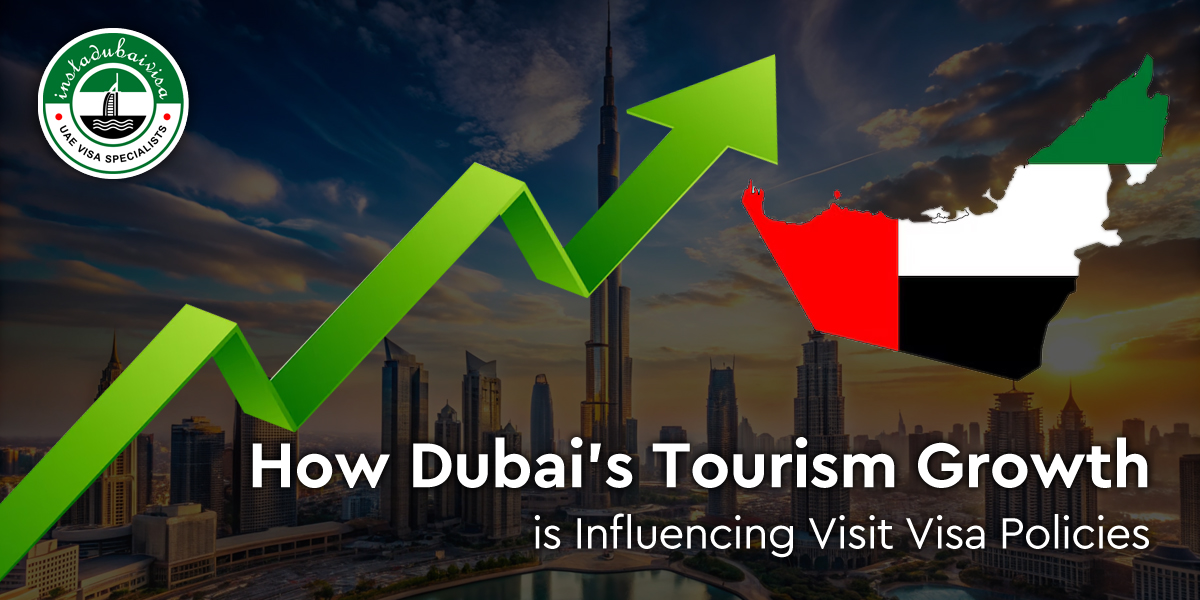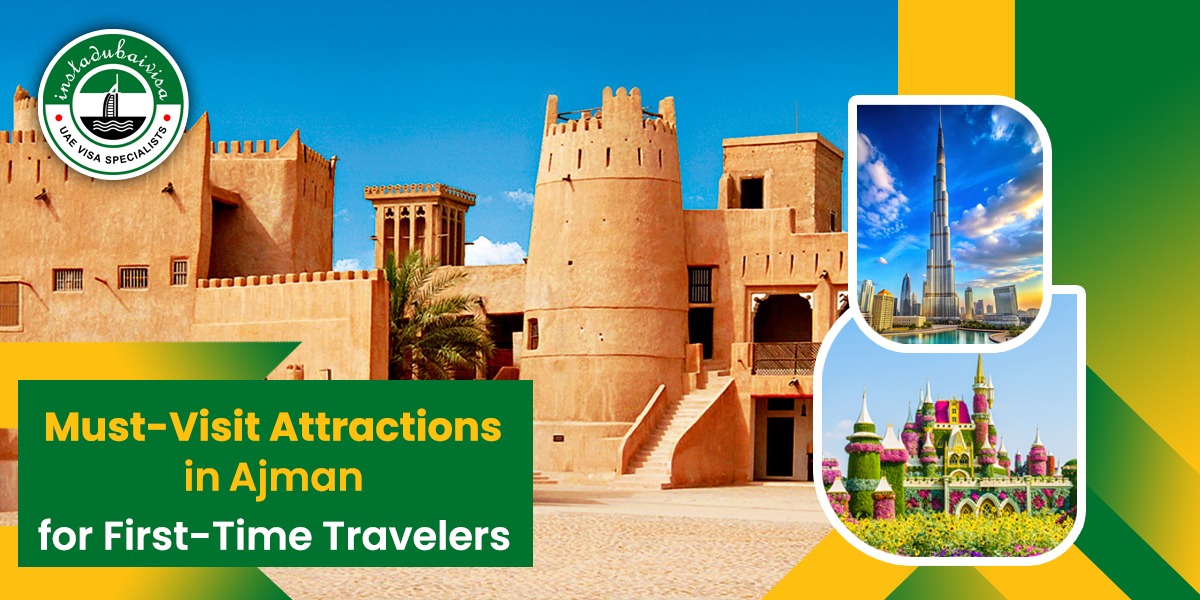The question of how visa policies influence tourism growth, particularly with Dubai's introduction of new visa categories, has many facets and answers.
The interplay between Dubai's tourism growth and visa policies is not just a matter of numbers; it's about the experiences and stories each visitor brings. As more tourists arrive, they share their experiences on social media, recommend the destination to friends, and influence future travellers. This organic word-of-mouth marketing, fueled by a more straightforward visa process, creates increased interest and demand.
On the other hand, introducing every new category draws people worldwide to apply for visas, continuing to contribute significantly to tourism growth.
So, what do you think? Is it the new category of Dubai Visit visas, or tourists in general?
Let's do it together and see how both counterparts work.
Dubai's Tourism Growth Over the Years of Visa Upgrade
In 2023, Dubai was tagged as the 4th most visited place in the world. This state makes it clear that it's people's favourite travel destination. The credit goes to its unique blend of modern luxury, cultural diversity, and iconic landmarks. Over the years, the city has transformed from a small desert town to a global tourism powerhouse. This rapid growth has been fueled by a strategic focus on Dubai's tourism, with the government investing heavily in infrastructure, hospitality, and events that cater to a wide range of travellers.
In recent years, the emirate has seen record-breaking numbers regarding Dubai's tourism rate. In 2022 alone, over 14 million international visitors explored the city, marking a significant recovery post-pandemic. Later, at the end of 2023, the number nearly increased to 17.12 million international tourists.
What continues to draw such numbers?
The key tourist attractions—such as the Burj Khalifa, Palm Jumeirah, and Dubai Mall—continue to draw millions of tourists annually. Add to this its stunning beaches, luxury hotels, and world-class shopping experiences, and it's easy to see why Dubai is a must-visit destination for travellers worldwide.
The numbers, events, and plans all highlight one thing- Dubai's tourism is booming, and this growth is set to continue. The next question is, how will Dubai manage this increasing influx of visitors while making entry more accessible through its Dubai visit visa policies? Or how did they manage to accommodate the increased number of tourist after the pandemic through their visa policies?
Evolution of Dubai Visit Visa Policies
Dubai's visit visa policies have undergone significant over the years, mirroring its rapid tourism growth and the city's aim to make travel more accessible.
Initially, the UAE's visa system was relatively restrictive, requiring travellers from most countries to apply for Dubai visit visas well in advance. This process, though straightforward, could sometimes discourage last-minute tourists or spontaneous visitors. The country recognised the need for greater flexibility; the Dubai government began implementing reforms to make entry more accessible for tourists.
Today, Dubai's visit visa system is much more dynamic and inclusive, with multiple visa options designed to cater to the needs of different types of visitors. For instance, tourists can now choose between short-term and long-term visit visas, depending on the duration of their stay.
The most common type is the single-entry 30-day Dubai visit visa, which allows visitors to explore the city at their own pace. Visitors looking for deeper exploration can have a 90-day visit visa for extended vacations, business meetings, or family visits without frequent renewals. These were the smaller steps towards understanding the needs of the tourists and then implementing them by introducing new visa types.
The Policy Reforms Introduced Over the Years
The government has recognised the need to adopt more flexible and traveller-friendly visa regulations. The relationship between tourism growth and visa reforms is clear- as Dubai's visitor numbers rise, its visa policies are becoming more relaxed and adaptable, ensuring the city remains accessible to a diverse range of international travellers.
The visa reforms introduced within the last decades are-
- Visa-Free Entry
The UAE has expanded its list of countries eligible for visa-free entry. This has made it easier for citizens of these countries to visit the UAE for Dubai tourism and business purposes, driving tourism growth.
- Visa-On-Arrival Expansion
Dubai's visit visa-on-arrival policy now extends to over 70 countries, simplifying the entry process for spontaneous and last-minute travellers. Key tourist markets, including the UK, EU, and the USA, benefit from this streamlined approach, making Dubai more accessible to a larger pool of international visitors.
- Multiple-Entry Visas
Introduced initially during Expo 2020, the multiple-entry Dubai visit visa has become a permanent feature. It offers convenience to business travellers and frequent visitors, allowing them to make multiple trips without the hassle of reapplying. This policy has significantly boosted the number of return visits, contributing to more extended average stays in the city.
Read More: Sharjah Tourism: All You Need to Know
- New Long-Term Visas
Dubai introduced visas that were more than multiple entries to grow the economy. These visas permit business people to stay in the country for more than 10 years without having to leave after a certain period to maintain their residency.
- Golden Visa- The UAE has introduced the Golden Visa, a long-term residency visa for investors, entrepreneurs, researchers, and professionals. The visa grants the holder the right to live and work in the UAE for 5 years with a multiple-entry option. This has attracted high-net-worth individuals and skilled workers to the country, boosting the economy and tourism.
- Green Visa- The Green Visa is a new residency visa for skilled workers and their families. It offers a flexible and affordable option for those seeking employment in the UAE, potentially leading to increased tourism as these individuals bring their families along.
- Blue Residency Visa- The 10-year Blue Residency visa offers a stable and attractive option for individuals seeking long-term residency and career opportunities in the UAE. The Dubai visit visa grants holders the right to live and work in the UAE for 10 years. Travellers can enter and exit the UAE multiple times during the validity period. It became a pathway for skilled professionals, entrepreneurs, and investors to establish themselves.
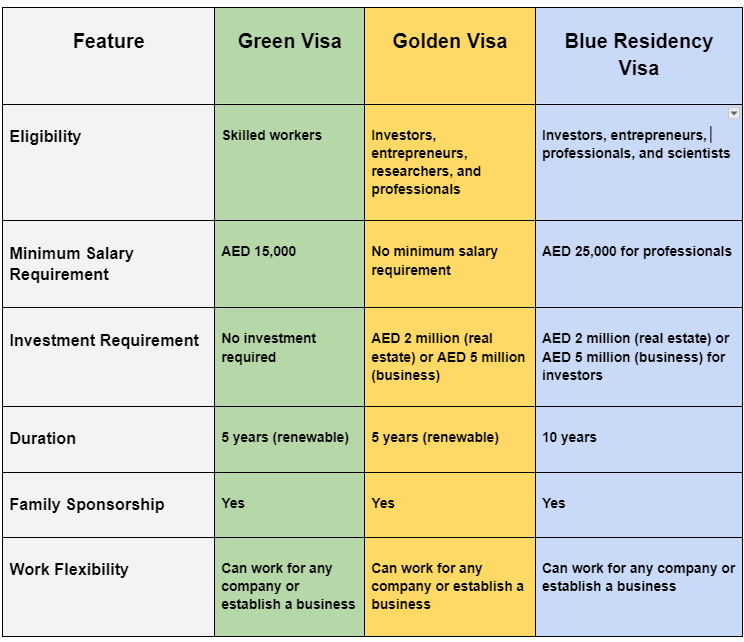
- Electronic Visa (E-visa)
The introduction of the Dubai e-visa has streamlined the visa application process. Travellers can now apply for and obtain their visas online without visiting an embassy or consulate. This has made it easier and more accessible for tourists from various countries. With this, Dubai has enhanced its reputation as a tourist-friendly destination that values convenience.
- Specialized Event Visas
In line with its status as a global events hub, Dubai has introduced specialised event visas for attendees of major exhibitions, conferences, and festivals. These Dubai visas simplify the entry process for participants and spectators, attracting a significant influx of tourists during high-profile events like Expo 2020 and the Dubai Shopping Festival.
Market-Specific Dubai Visit Visa Reforms That Attracted Tourists
- Indian Tourist Visa Reforms
India is one of Dubai's most significant tourism source markets. To attract more Indian travellers, Dubai has introduced several initiatives-
- E-Visa Facility- Introducing a simplified Dubai e-visa application process allows Indian tourists to obtain their visas quickly and conveniently online. This reduction in bureaucratic hurdles has significantly increased the number of Indian visitors.
- Long-Term Visit Visa for Families- Recognizing the solid familial ties and the trend of family vacations, Dubai has offered long-term visas for Indian families, enabling them to enjoy extended stays.
- Cultural Promotions- Collaborations with Bollywood and Indian cultural events have highlighted Dubai as a popular holiday destination, further enticing Indian tourists.
- Chinese Tourist Visa Initiatives
China represents a rapidly growing market for Dubai tourism. The following reforms have been implemented to attract Chinese travellers-
- Visa-on-Arrival- Visa-on-arrival for Chinese nationals has streamlined entry, encouraging spontaneous travel to Dubai.
- Tailored Packages- Travel agencies in Dubai have created specialised packages that cater to Chinese tourists' preferences, focusing on shopping, dining, and cultural experiences.
- Gulf Cooperation Council (GCC) Countries
Tourists from neighbouring GCC countries often travel to Dubai for shopping, entertainment, and leisure-
- Simplified Entry Requirements- Dubai has implemented relaxed entry requirements for GCC nationals, allowing quicker access.
- Joint Promotions- Collaborative marketing efforts highlighting events and attractions specifically for GCC residents have further strengthened Dubai tourism from these nations.
- European Tourists
To attract visitors from Europe, particularly during peak seasons, Dubai has made several adjustments-
- Extended Visa Validity- Offering longer visa validity periods for European tourists encourages extended stays, promoting deeper city exploration.
- Special Events and Festivals- The city has tailored events that resonate with European cultures, such as Christmas markets and Oktoberfest, making Dubai an attractive winter destination.
- Russian and CIS (Commonwealth of Independent States) Countries
The Russian market has shown significant growth, especially during the winter months-
- Visa-Free Entry for Tour Groups- Group tourists from Russia and other CIS countries can enter Dubai without a visa, simplifying the travel process.
- Luxury Travel Packages- Customized luxury travel packages with high-end experiences are designed to attract affluent Russian travellers.
- Southeast Asia
- Visa-Free Entry- Dubai has granted visa-free entry to citizens of several Southeast Asian countries, including Indonesia, Malaysia, the Philippines, Singapore, Thailand, and Vietnam.
- Cultural Events- Dubai has organised cultural events and festivals featuring Southeast Asian performers and cuisine to attract tourists from the region.
Visa Reforms Impact on Dubai Tourism Numbers
From 2021 to 2024, Dubai's tourism industry witnessed significant growth, primarily driven by progressive visa reforms. These policies made the city more accessible to a broader range of tourists, from frequent travellers to digital nomads, boosting tourism numbers and contributing to the city's economic recovery post-pandemic.
Read More: Can We Travel from India to Dubai on a Visit Visa?
Here are some critical changes in tourism numbers over the past four years directly linked to introducing new and relaxed visa categories.
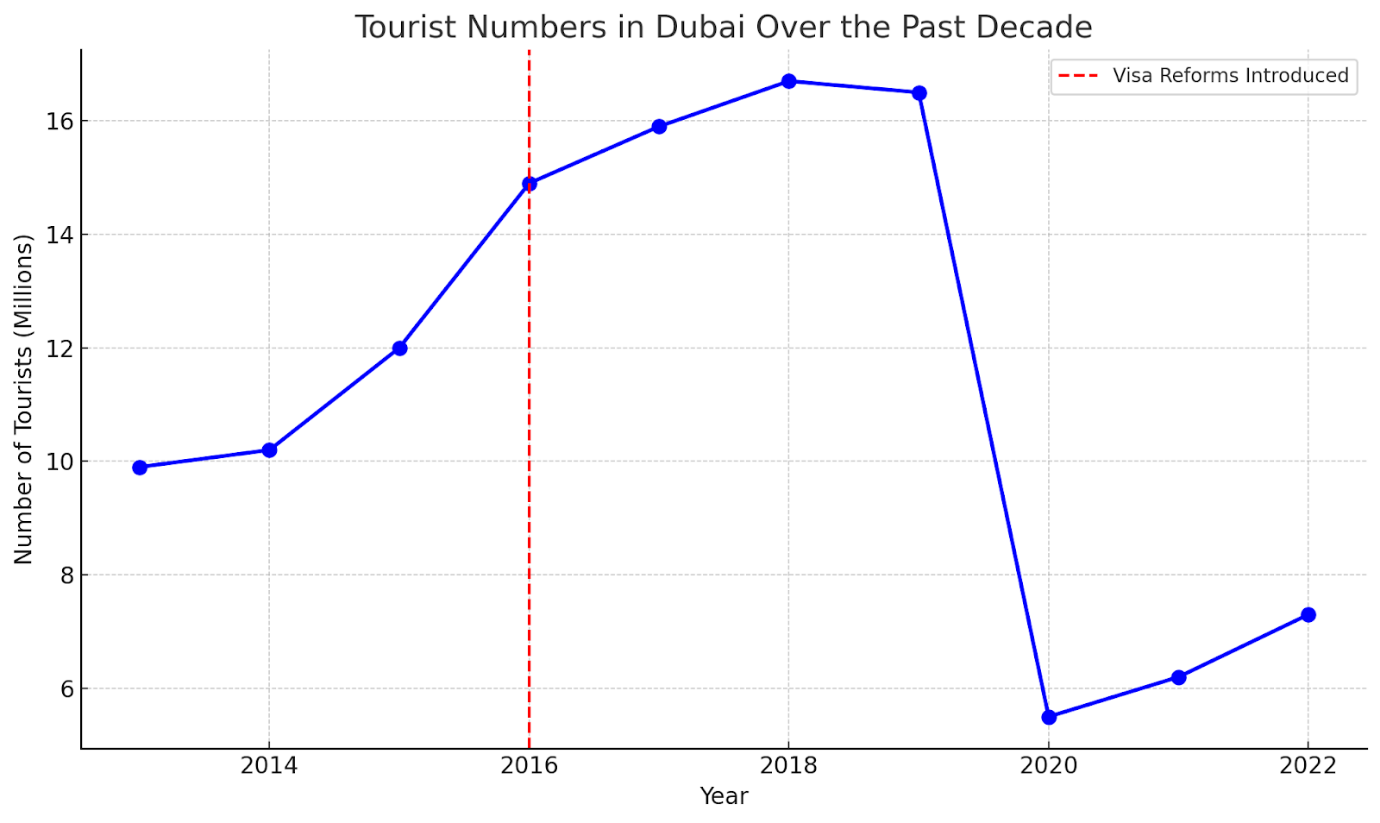
- 2021- Recovery Phase Post-Pandemic
In 2021, Dubai recorded 7.28 million international visitors as the city recovered from the COVID-19 pandemic. Introducing the Remote Work Visa and visa-on-arrival expansions was crucial in stimulating Dubai tourism, allowing more visitors to enter without strict visa application processes.
- Visa Reforms in Action- The UAE government relaxed several entry restrictions. It promoted the five-year multiple-entry visa to encourage longer stays and repeat visits, especially for travellers seeking to work remotely.
- 2022- Major Boost from Expo 2020
With the rescheduled Expo 2020 in full swing, Dubai attracted 14.36 million tourists by the end of 2022. This visitor surge can be directly tied to the introduction of the multiple-entry Dubai tourist visa, which made it easier for tourists and businesspeople to visit the city multiple times during the six-month event.
- Longer Stay Patterns- The city saw a notable increase in the average length of stay as the visa reforms allowed for extended visits. The success of Expo 2020 also highlighted the importance of event-specific visa categories, which could be expanded to support large-scale events.
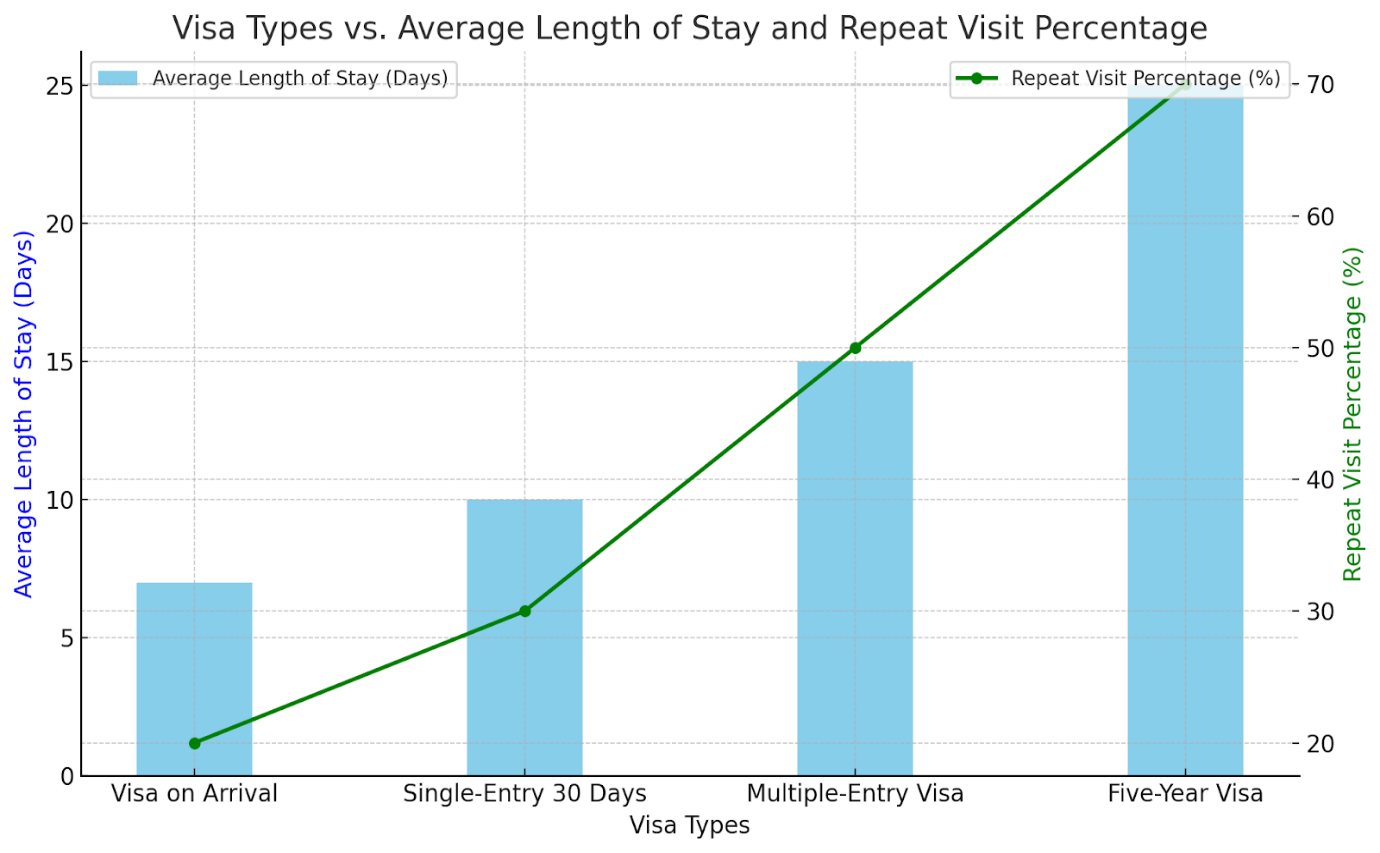
- 2023- Focus on Target Markets
In 2023, Dubai welcomed 16.73 million international visitors, with the majority arriving from countries benefiting from simplified visa processes, such as India, Russia, and China. The visa-free entry for Chinese tourists, introduced in 2016, continued to pay dividends, with a noticeable increase in visitors from China following the easing of global travel restrictions.
- Market-Specific Reforms- Dubai further streamlined visa processes for Russia and India, offering faster approval times and multiple entry options for crucial tourist markets. The result was a spike in visitors from these countries, fueling Dubai's tourism recovery and growth trajectory.
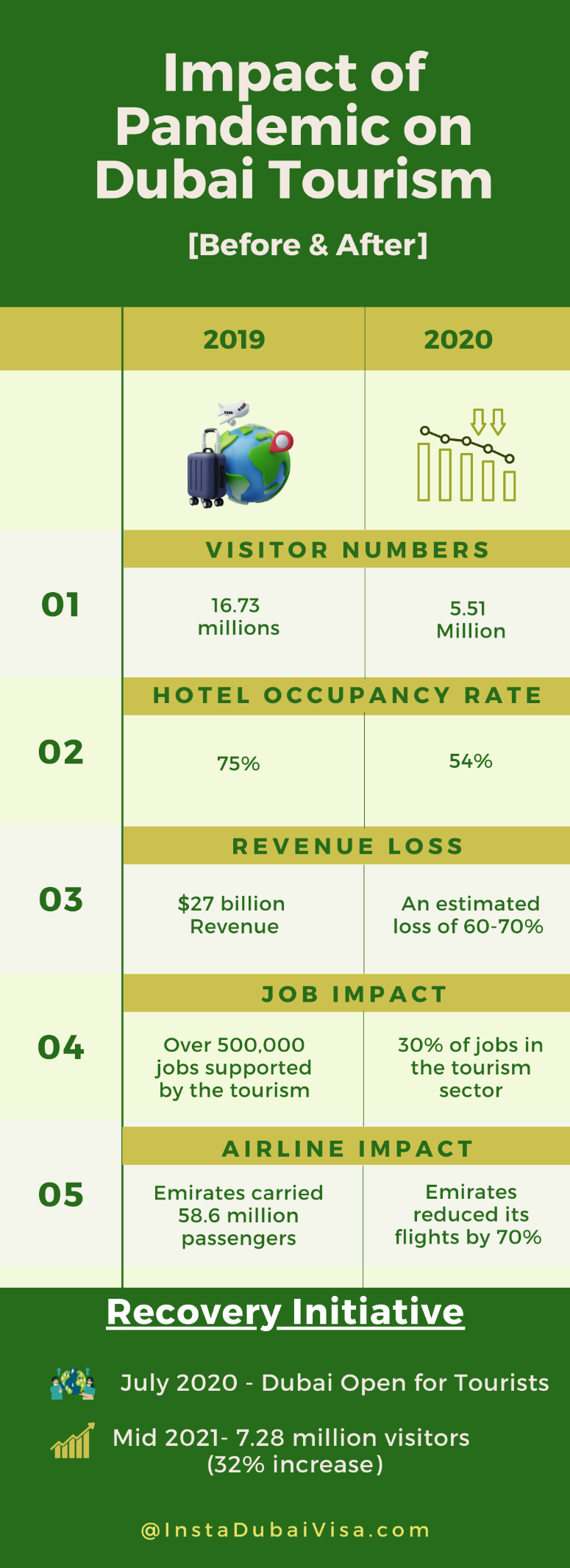
- 2024- Sustained Growth and Innovation
By 2024, Dubai is expected to reach its pre-pandemic levels with an estimated 18 million visitors. In the first 6 months of 2024, Dubai experienced 9 Million international tourists. The numbers are expected to double for the second half, primarily due to the peak season. The city's growing appeal to digital nomads, thanks to the remote work visa and longer-term residency options, is expected to contribute significantly to these figures.
- Innovation in Visa Policies- New visa reforms introduced in 2024 include additional specialised visa categories, such as eco-tourism and medical visas, further attracting niche markets and diversifying the tourist demographic.
Economic Impact of Dubai Visit Visa Policy Changes
Dubai's forward-thinking visa reforms have had a significant economic impact, particularly in critical sectors such as tourism, real estate, hospitality, and retail. These policies have stimulated short-term financial gains and contributed to long-term growth strategies.
- Boosting Tourism Revenues
As Dubai's visit visa policies have made it easier for tourists to visit Dubai, the city has seen a rise in visitor spending. In 2022, Dubai recorded $14.36 billion in international tourist spending, significantly benefiting hospitality and retail.
By 2024, tourism revenues will increase by 23%, driven by more extended stays and repeat visits from tourists taking advantage of multiple-entry and long-term visas. The average spending per visitor is expected to rise to $16.7 billion by the end of the year.
The introduction of five-year multiple-entry visas increased the average length of stay, with tourists staying 15-20% longer, resulting in more spending on accommodation, dining, and leisure activities.
- Growth in the Hospitality Sector
Dubai has experienced higher hotel occupancy rates. 2022 saw hotel occupancy rates rise to 76%, with the average daily rate (ADR) for hotel rooms reaching $150.
In 2023, occupancy rates increased to 81%, with the ADR jumping to $165. The growth continued into 2024, reaching 85% occupancy, mainly due to Dubai visit visa policies encouraging more extended tourist stays and repeat visits.
This increased demand for hotel stays led to a 7.5% increase in revenue per available room (RevPAR) in 2023, and this trend is projected to rise another 8% by 2024. Long-stay packages and enhanced hotel services became more common, meeting the needs of business travellers, remote workers, and families staying for extended periods.
- Retail and Shopping Growth
Retailers have increasingly tailored their promotions to attract international visitors, offering tax-free shopping and exclusive discounts for long-stay tourists, further driving sales growth. In 2022, Dubai's retail sector grew by 12%, driven by international tourists benefiting from tax-free shopping and exclusive promotions targeting long-stay visitors.
By 2023, this growth reached 14%, with shopping centres like The Dubai Mall and Mall of the Emirates reporting increased footfall from tourists staying longer.
In 2024, the retail industry expects an additional 10-12% increase in revenues due to remote workers and business travellers making regular trips, further bolstered by Dubai visit visa reforms.
- Job Creation and Economic Diversification
Dubai's tourism and hospitality boom contributed to job creation in hotels, restaurants, retail, and transportation.
By 2023, Dubai had created over 60,000 new jobs in tourism-related industries. In 2024, the job market is expected to grow by another 5-6% as tourism expands.
The Remote Work Visa brought foreign professionals to Dubai, stimulating demand for services and housing and contributing to job growth in real estate, education, and business services.
These Dubai visa reforms support the emirate's goal of diversifying its economy beyond oil, fostering real estate, healthcare, and education growth. By 2024, non-oil sectors are projected to contribute 73% of Dubai's GDP, up from 70% in 2022.
Future Outlook- Predictions for Dubai's Visit Visa Policies
As Dubai continues its upward trajectory as a global tourism hub, its visa policies are expected to evolve in alignment with its broader economic and social goals. The next decade promises further innovation in how the city attracts and retains visitors, with visa reforms playing a pivotal role in supporting Dubai's tourism strategy and Vision 2040.
Predictions for Dubai's Tourism Strategy and Visa Evolution
#1 Dubai aims to attract 25 million annual visitors by 2025. To support this, the city is expected to continue relaxing visa restrictions and introducing more flexible visa types to cater to diverse visitor profiles.
#2 Long-term and multiple-entry visas will likely become more accessible to a broader range of tourists, encouraging repeat visits and more extended stays. This trend will significantly increase tourist spending and extended stays across business, leisure, and family-oriented travel categories.
#3 Dubai's visit visa policies are predicted to become more tailored to emerging markets, especially in Southeast Asia and Africa, where rapid middle-class growth fuels outbound tourism. More simplified visa processes for these markets will further bolster Dubai's tourism numbers.
Read More: UAE Tourism: Your Guide to Top Spots and UAE Visa Essentials
- Potential New Visa Categories
#1 With the rise of remote work, Dubai is expected to continue capitalising on the global trend of digital nomadism. Although the Remote Work Visa was introduced recently, we might see even more specialised digital nomad visas tailored to freelancers, start-up founders, and tech entrepreneurs. This will allow them to live and work in Dubai for extended periods.
#2 As eco-tourism and wellness tourism grow globally, Dubai may introduce visas for these niche markets. Eco-tourist visas could encourage long-term visitors interested in sustainable travel experiences. In contrast, medical tourism visas could support those visiting Dubai for health-related services, aligning with the UAE's efforts to promote itself as a healthcare hub.
#3 Dubai is known for hosting global events such as World Expo, GITEX, and Dubai Shopping Festival. Future Dubai visit visa categories could be tailored to visitors attending these large-scale events, offering simplified processes for those attending conferences, exhibitions, or sports events.
Read More: Wander Abu Dhabi with Abu Dhabi Visa: Essential Tourist Attractions and Insider Tips
- The Role of Global Events and Partnerships
#1 Dubai's successful hosting of Expo 2020 demonstrated the impact significant events can have on tourism policies. The city will continue to leverage such mega-events to attract millions of visitors. Events like COP28 and potential bids for future Olympic Games could drive additional reforms in Dubai visit visa policies, further enhancing the city's appeal as a global meeting point.
#2 Dubai's strong partnerships with airlines like Emirates and global travel brands will likely result in new visa services bundled with travel bookings. These partnerships can offer more accessible, streamlined Dubai visa applications tied directly to flight or accommodation bookings, further enhancing the convenience of visiting Dubai.
#3 As Dubai continues strengthening its role as a hub for global business and finance, we can expect increased collaboration with countries across Asia, Europe, and North America to liberalise visa regulations further, especially for business travellers. Such partnerships will ensure that Dubai remains a crucial leisure and corporate tourism destination.
Dubai Visit Visa–Ever Upgrading Process
The evolution of Dubai's visit visa policies is intrinsically linked to its tourism growth. Each new category reflects the city's commitment to accommodating diverse visitors and contributes to its reputation as a dynamic and welcoming destination. By continuing to innovate in this area, Dubai is setting a benchmark for other global cities, demonstrating that thoughtful visa policies can significantly enhance the tourism experience.

